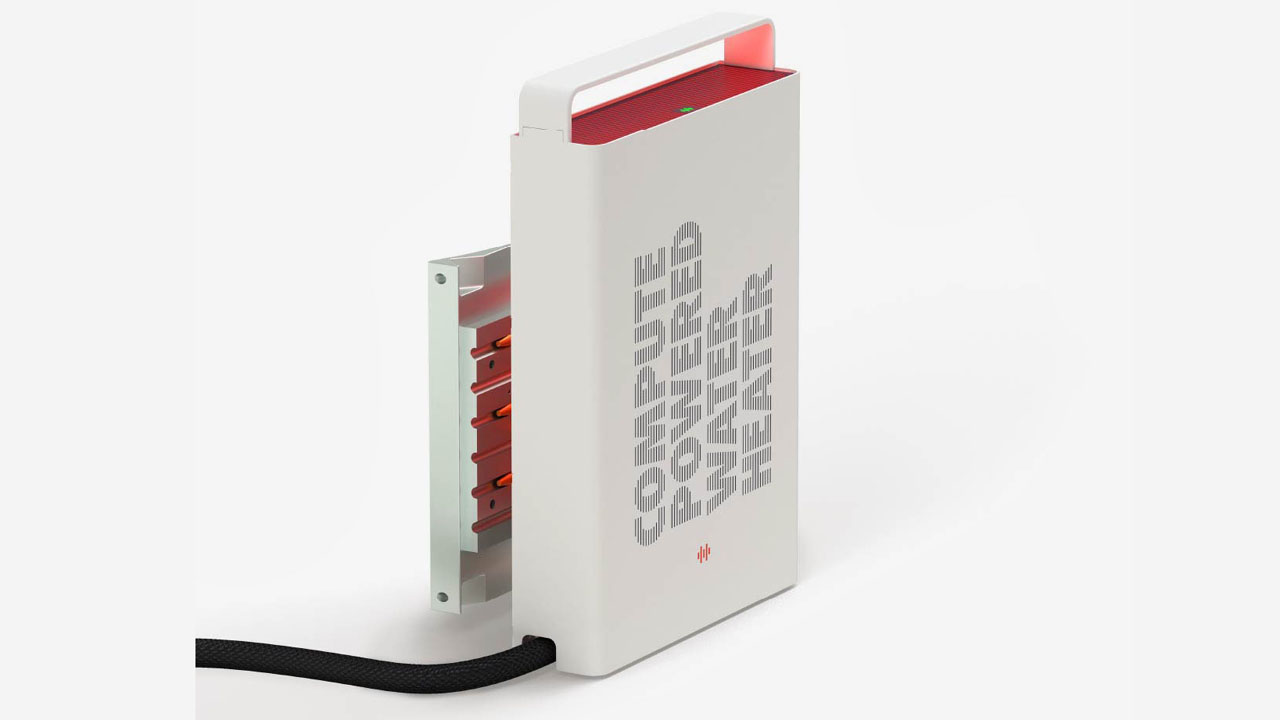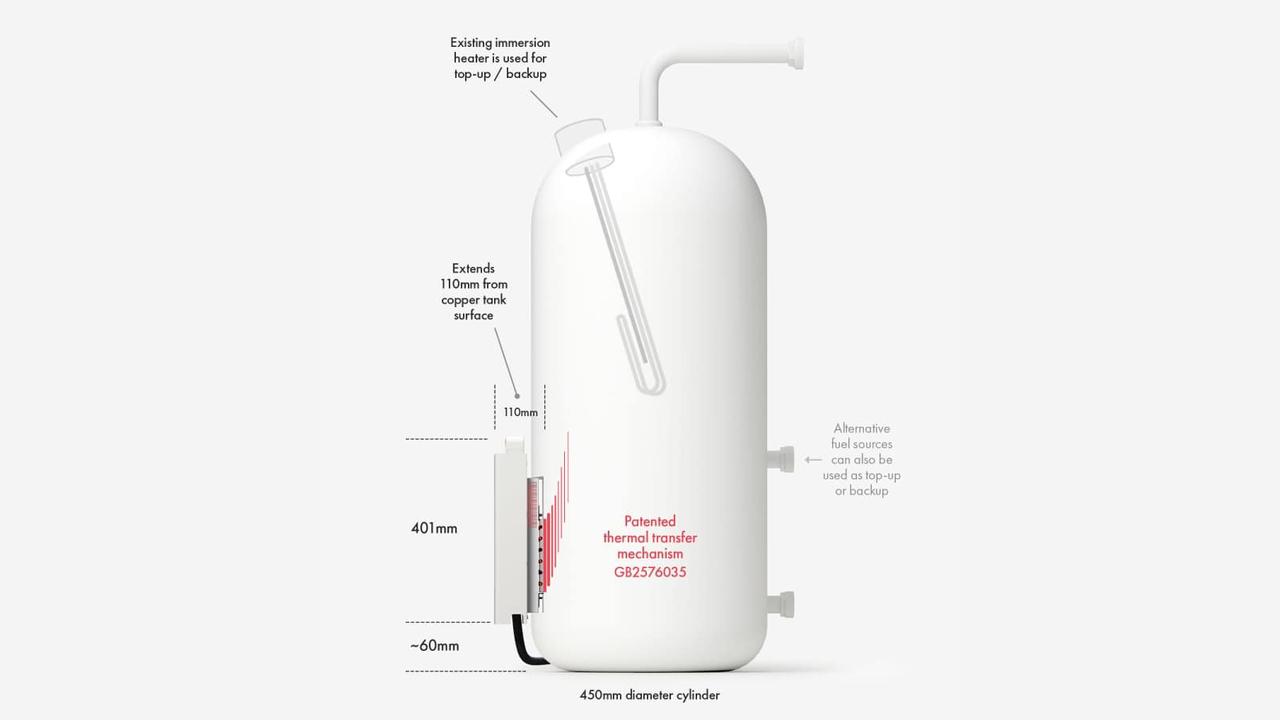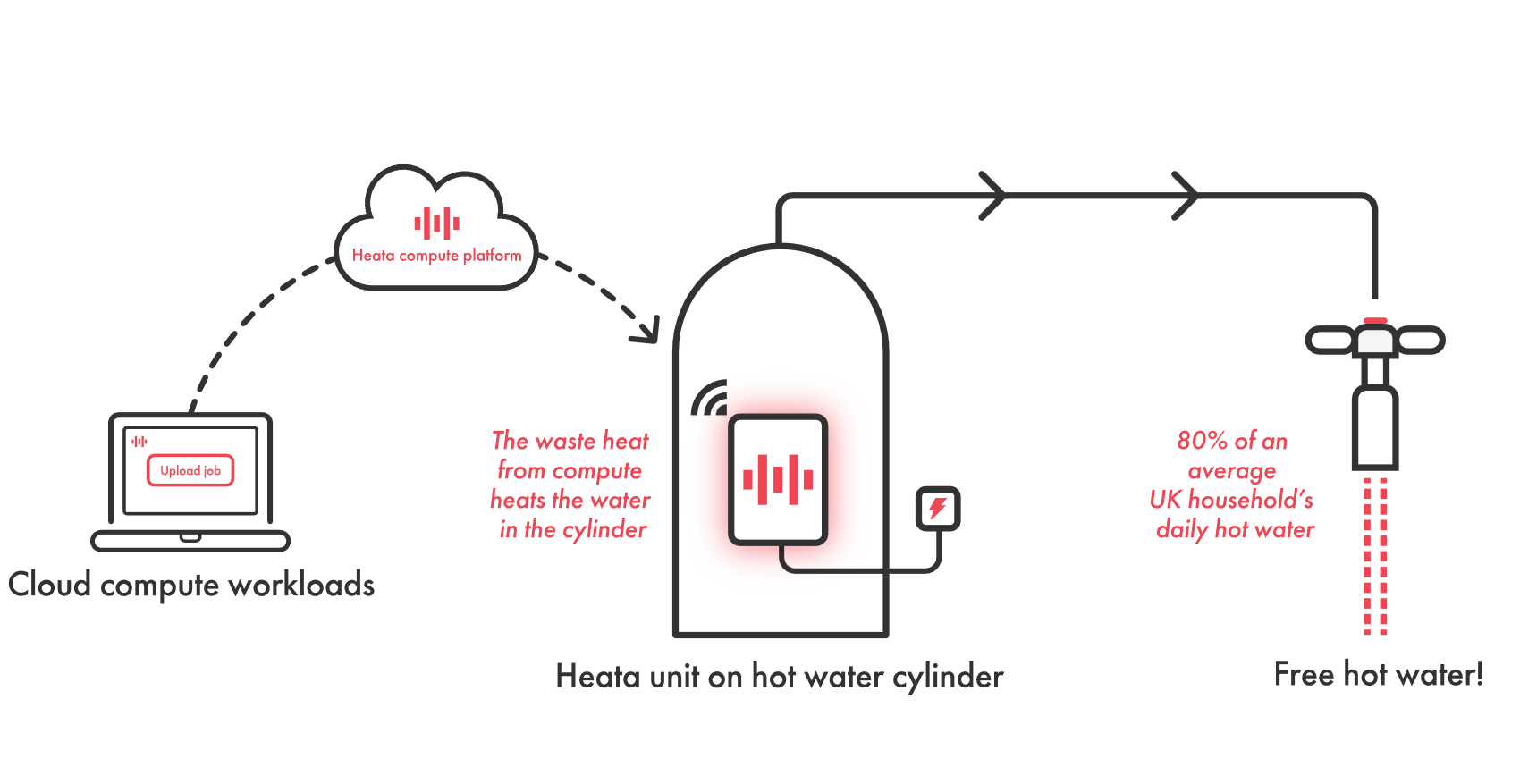Heata Offers UK Residents Free Hot Water in Exchange for Cooling Its Servers
Okay, it's only 4.8kWh/day, and it's only for a year. And also you have to let them install a server in your house. And maybe use your broadband. But...worth it?

Ready to take liquid-cooling to the next level, but on someone else's hardware, and get free hot water in the process? Networking company Heata is currently offering UK residents free hot water for a year if they sign up to be part of the brand's trial roll-out of its new service.
There's a catch, of course (okay, there's more than one): You'll have to allow Heata to install one of its water-heating server units in your home. The unit doesn't replace your existing heating unit, it works alongside it — providing some, but not all, of your hot water needs.
According to the company, the unit will provide "a useful base load" of hot water, and can provide up to 4.8kWh of hot water per day, though the exact amount will depend on usage as well as other factors. Heata is obligated to provide a minimum of 2.5kWh per day. Heata estimates its hosts will save up to £200 per year, based on average household hot water use.

Heata will take care of the installation, which takes under two hours and has been tested with British Gas engineers and checked to ensure it doesn't invalidate cylinder warranties with "a leading cylinder manufacturer." Not everyone will be eligible to join Heata's trial, of course — Heata's unit is designed for vented domestic hot water cylinders with a diameter of 425 - 450mm, and there will need to be an adequate amount of clearance space around the unit for the installation.
The unit will need both electricity and broadband to run. Heata will take care of the electricity via reimbursement: the electricity used to run the unit will be metered (visible to the host), and Heata will credit the host for the electricity used at 10% above the market rate.
It's not quite as clear how the broadband will be taken care of — in Heata's FAQ on its trial signup page, it says that Heata will need to connect to your broadband to communicate with the units. While the company assures that "most of the time the unit will simply be sending some monitoring information (temperatures/fan speeds etc) back to base)," so you "shouldn't notice any impact," that's still not great from a privacy standpoint.
It also says it will occasionally perform speed tests, limiting larger uploads/downloads to "a fraction of this" so as not to use too much bandwidth, and that these will be scheduled overnight so as not to affect daytime speeds. On the signup page, it also states that it plans to install a "dedicated fibre or 4G/5G connection" for the unit in the future. However, in its more detailed brochure (PDF), it says the Heata unit will use "its own connection, which will be either a dedicated fiber line, or connection via 4G/5G."
Get Tom's Hardware's best news and in-depth reviews, straight to your inbox.

As for the server, you won't be able to access it or use it to mine crypto or whatever you were hoping to do with it. Heata sells its compute services to businesses looking for sustainable alternatives to data centers (read: ESG points). The Heata trial lasts for one year, and may be extended, "depending on how things go." Heata says it will take care of removing the installed unit and re-insulating the section of the cylinder that the unit was attached to.
Heata is not the only company trying to find ways to repurpose server heat — Microsoft's new data center in Finland reported that it would be directing its waste heat to warm the homes of local residents, covering approximately 40% of the heating needs for 250,000 people. And a data center in Hokkaido, Japan last year was reportedly using heated waste water in an eel farm.
If you're in the UK and more interested in "free" hot water than eels, you can sign up for Heata's trial here.

Sarah Jacobsson Purewal is a senior editor at Tom's Hardware covering peripherals, software, and custom builds. You can find more of her work in PCWorld, Macworld, TechHive, CNET, Gizmodo, Tom's Guide, PC Gamer, Men's Health, Men's Fitness, SHAPE, Cosmopolitan, and just about everywhere else.
-
Amdlova That's cool. You have to spare some room. Nobreak / server/ New power lines / New broadband you cannot use. In the end you can have warmer water.Reply
Every one need a cluster in your house. Lol -
USAFRet "Okay, it's only 4.8kWh/day, and it's only for a year. And also you have to let them install a server in your house. And maybe use your broadband."Reply
And what, in the fine print, tells you what information YOU give up in the process. -
edzieba A neat idea, but no good for most who have already switched to combi-boilers and gotten rid of inefficient hot water tank systems.Reply -
gg83 The idea is awesome! We could eventually make something like this work. We have a lot of wasted energy as heat in our daily lives. Even if we could convert 10% of waste energy into a usable form.Reply -
BillyBuerger Yeah, this isn't a bad idea, but I feel like it would be more efficient in things like apartment buildings where you could actually have a room full of servers where the heat could be used for the whole complex instead of just one server at one house. Or in an office building. Something larger scale. Maybe that's the plan and they're just trying to prove it out on individuals. But there's also the security part of it. How can they ensure these systems that are in individuals houses can't be tampered with and the potential of data being compromised or systems being stolen.Reply -
bit_user I've heard of heat/power co-generation plants, where they take the "waste" steam from natural gas power turbines and route it through a campus for heating. This is kinda similar, but at the power consumption end.Reply
Microsoft's new data center in Finland reported that it would be directing its waste heat to warm the homes of local residents, covering approximately 40% of the heating needs for 250,000 people. And a data center in Hokkaido, Japan last year was reportedly using heated waste water in an eel farm.
I was thinking it'd be interesting to locate a datacenter near a city, where you could actually pipe the waste heat into buildings, during the winter. That only provides efficiencies during the winter, though. Maybe there are some industrial applications for server waste heat, but I'm not sure how much of it would be on datacenter scale. I don't imagine an eel farm takes a significant fraction of datacenter waste heat, but maybe it's a really big eel farm.
BTW, I wonder how much energy you could recover from datacenter waste heat. Especially if it were located somewhere with plenty of water, so you could use evaporative cooling. -
bit_user Reply
Exactly. It feels like such a waste when I'm running the heater and thinking "I could actually be using this energy to do something useful". That's why I like the idea of co-generation, for instance.gg83 said:We have a lot of wasted energy as heat in our daily lives. Even if we could convert 10% of waste energy into a usable form.
It would probably be a lot more compelling, were residential heating not already being subsidized by the government.
Modern CPUs support memory encryption. So, even having physical access to the machine doesn't mean you'll be able to monitor or manipulate what it's running.BillyBuerger said:But there's also the security part of it. How can they ensure these systems that are in individuals houses can't be tampered with and the potential of data being compromised or systems being stolen.
Regarding theft of the hardware, I wonder if the home owner needs to pay a deposit on it. That would be the cleanest way, but it seems a big ask for them to put down a deposit of probably a couple $k, only to receive $200 worth of free hot water per year. But, at least that way, if the home is burglarized, the home owner goes through their insurance to recoup their deposit, rather than the service needing to worry about who/how/why the server disappeared. -
USAFRet Reply
The idea is good. Waste industrial heat to warm residential.gg83 said:The idea is awesome! We could eventually make something like this work. We have a lot of wasted energy as heat in our daily lives. Even if we could convert 10% of waste energy into a usable form.
This particular implementation, not.
They want to install a server in my house? And use my internet connection?
Not even a little bit.
"Trust us, it is secure." yeah, right.